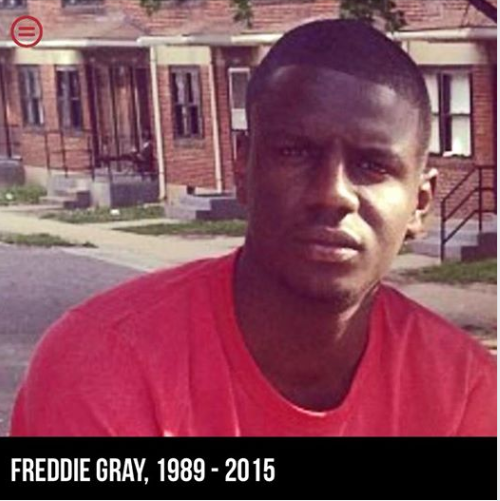[Book Excerpt #8\”The Roots of Racism in American Policing”]
Twenty-five years after the L.A. Rebellion, on April 19, 2015, Baltimore native Freddie Gray died, after being in a coma from a severed spine he received while being arrested on April 12, 2015.
Photo: Facebook
Freddie Gray victimized, brutalized and killed by American Policing. Gray died on April 19, 2015, after suffering for eight days in a coma from injuries to his spinal cord.
The following is an excerpt from the upcoming book “The Roots of Racism in American Policing: From Slave Patrols to Stop-and-Frisk.”
Over the last few weeks, the Black Star News has been publishing selected portions from the book.
The following excerpt is from Chapter 3.
April 29, 2017, represented twenty-five years since the infamous 1992 Los Angeles Rebellion, (which is usually referred to as a riot, a term I will refrain from using) in California. The Los Angeles Rebellion was sparked after a jury (from the White police-community of Simi Valley) acquitted four Los Angeles police officers of all charges in the Rodney King assault trial, despite video evidence showing them brutally beating him. All these years later, we must ask: has White America made any concrete changes to punish police who abuse and kill Black-Americans unjustly?
Recent events tell us the answer to that is no.
Twenty-five years after the L.A. Rebellion, on April 19, 2015, Baltimore native Freddie Gray died, after being in a coma from a severed spine he received while being brutally arrested on April 12, 2015. Gray’s only crime was running while Black. Much was made of the fact that Gray may have been injured by a so-called “rough ride,” an awful police practice where police subject injured “perps” to more injury. But, according to a friend of Gray, police accosted Gray and “twisted him up like a pretzel.” On the video capturing Gray’s arrest, it was clear he was unable to walk while screaming out in pain.
By April 24, a major protest march turned violent in downtown Baltimore. Unlike the L.A. Rebellion, the violence wasn’t ushered in by an unjust verdict. And although two people were shot, along with numerous injuries, no one died. In the L.A. Rebellion, 58 people lost their lives.
However, the 1992 L.A. Rebellion, and the 2015 Baltimore Uprising, had the same basic root causes. Like so many other racial rebellions in American history, Black communities under economic oppression by White America, erupted in violence after police brutalized or killed a Black person.
In Los Angeles, the videotaped (rare for the time) beating of Rodney King was captured by bystander George Holliday and was sent to local news station KTLA. The beating occurred in the aftermath of an alleged high-speed chase. That video, like so many videos we’ve witnessed in recent years, shows a clear-cut instance of police brutality by four officers who are seen surrounding King beating him—while he lay on the street. The four officers were: Sgt. Stacey Koon, Officer Theodore Briseno, Officer Laurence Powell and Officer Timothy Wind.
The outrage caused by the video forced Los Angeles authorities to go through the motions and charge the four officers. But as is done now in the rare cases when police are charged for their crimes, the powers that be orchestrated the scenario so the “not guilty” outcome would be predestined by the actions of the prosecutors. The California Courts of Appeals’ decision to allow for a change of venue to the white police-friendly city of Simi Valley was the first act that would ensure a favorable outcome for police. Many local police called Simi Valley home. The move was justified as necessary based on grounds that the press coverage would be biased against police. It was claimed, the “excessive publicity and a highly charged political climate” would be prejudicial to the police.
Somehow, moving the venue to a community where many police live, apparently, didn’t seem to be an unfair move that would sway the outcome in favor of police to the police apologists. Why would the press coverage have been any less saturated in Simi Valley? If Rodney King had killed a police officer, would this court have worried about the “excessive publicity” and moved the trial to another city?
Make no mistake about it, what this court was essentially saying is Blacks couldn’t be trusted to judge this case fairly—as White people from a police community could. Not a single Black person served on this jury. In the infamous O.J. Simpson case, many Whites ranted and raved that Black jurors engaged in jury nullification after the not guilty verdict was rendered. But were the subsequent acquittals of these four officers, in the Rodney King case, anything more than white jury nullification?
The ensuing urban uprising that followed the acquittal of these brutal cops was an example of what Dr. Martin Luther King Jr. meant when he said: “a riot is the language of the unheard.” For centuries, American whites have been shutting their ears, eyes and mouths to the racism that affects African-Americans and infects this nation.
Unfortunately, violence is as “American as apple pie.” African-Americans have suffered, domestically speaking, from the brunt of that violence and oppression. Periodically, when the exploitation and oppression become unbearable African-Americans lash out venting violence. When this happens, it is because we, more often subconsciously, understand that violence is the one language White America understands. Black America knows this deep down inside our souls given the unspeakable levels of violence that has been used against us, ever since Blacks were brought into colonial America from Africa.
In fact, this periodic venting of violence, that they call riots, in my view, is but an extension of slave revolts, and our resistance to racism, and the economic exploitation from which it was spawned. This has occurred ever since we arrived here in these lands that are mistakenly called the Americas.
Given this, the racial uprising that followed in the aftermath of the Freddie Gray killing is nothing but a 21st Century extension of what has happened since the first Slave uprising in South Carolina, at the San Miguel de Gualdape settlement, in 1527.







